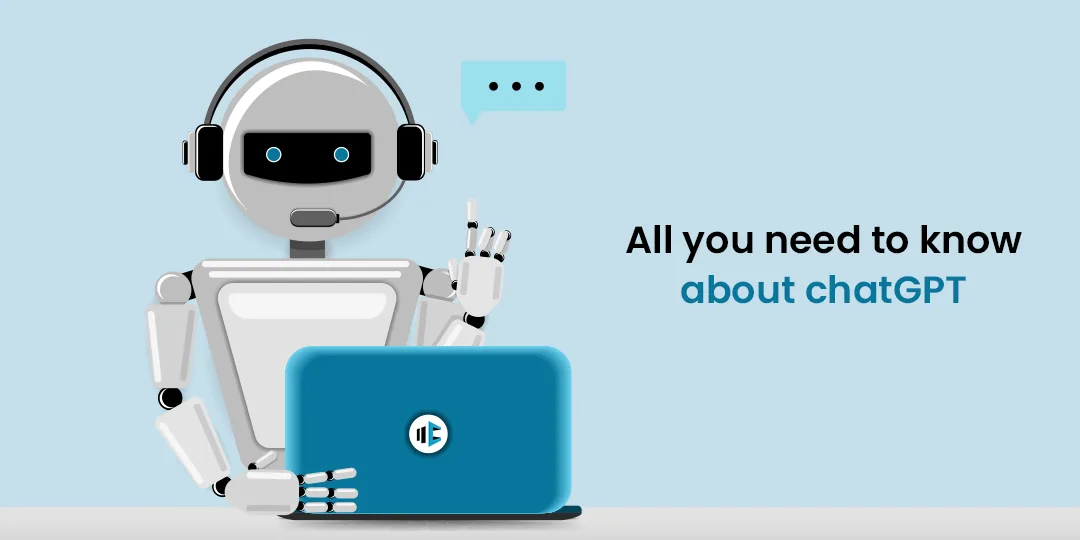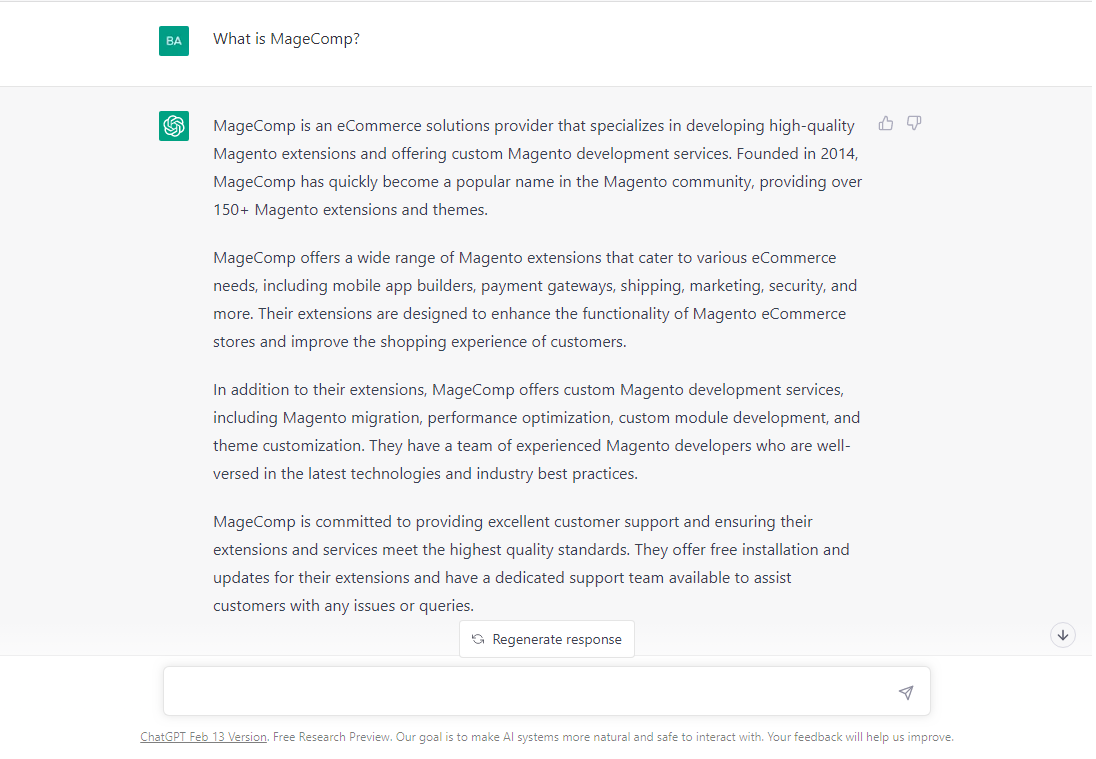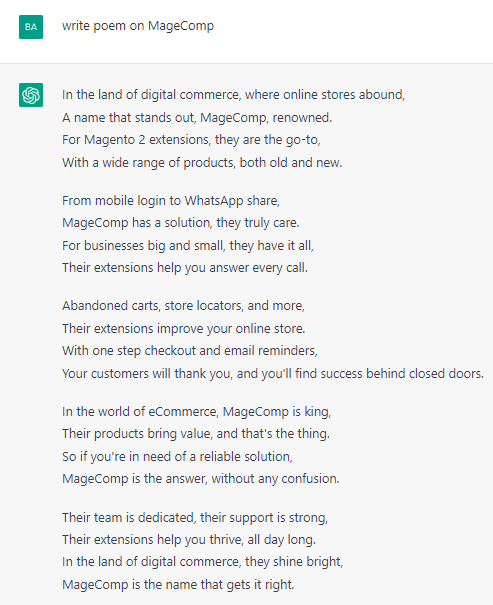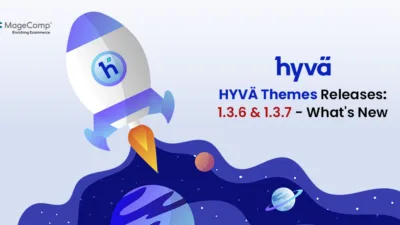As Artificial Intelligence (AI) continues to evolve and develop, it has changed the way we think and interact with each other every day. AI has greatly succeeded in every industry, whether healthcare, education, or business. Chatbots, robots, digital assistants, virtual assistants, automated vehicles, etc, are all part of AI.
You might have heard about the newly launched conversational chatbot – ChatGPT, which is creating a buzz around the internet.
Here’s all you gotta know about ChatGPT.
Introduction to ChatGPT
ChatGPT has proved how advanced artificial intelligence has become. It is the most advanced chatbot to date. Let’s explore what exactly ChatGPT is, who created it and how it works.
What is ChatGPT?
The giant ChatGPT is a language model that interacts with users in a conversational way. The generative AI chatbot is capable of answering complex questions. ChatGPT is a language processing tool driven by AI technology that allows having human-like conversations with the chatbot.
ChatGPT can respond to questions and help with tasks like writing essays, composing emails, and coding. It has a massive information set to generate accurate answers and predict the user query.
Who created ChatGPT?
A San Francisco-based AI research company, OpenAI, launched ChatGPT on 30th November, 2022. OpenAI has previously launched the popular DALLE•2 tool that generate images from text instructions.
ChatGPT uses the GPT-3 (Generative Pretrained Transformer 3) language model and has been fine-tuned to learning techniques. Since its launch, it has quickly gained popularity due to its accurate and detailed answers across many fields of knowledge.
How does ChatGPT work?
ChatGPT uses a combination of two language models – Supervised Learning and Reinforcement Learning to enhance its results. Reinforcement Learning from Human Feedback (RLHF) makes ChatGPT unique as it uses human feedback in the training loop to minimize harmful, untruthful, and/or discriminatory outputs.
It is a trained language model to produce content that humans understand. The model takes in the input, processes it using its internal knowledge, and then generates responses related to the input. The specialty of ChatGPT is that it can generate responses in the context of the conversation. The model can understand the flow of the conversation and produce answers that fit with what has been said previously.
Capabilities of ChatGPT
ChatGPT has gained the world’s attention due to its impressive level of intelligence. ChatGPT can converse, answer questions, generate content, write code, explain, and more. Let’s take a closer look at the capabilities of ChatGPT.
Conversational AI
ChatGPT can converse with you. It can remember previous prompts and chat with users for a long session. It is capable of understanding the implications of the questions presented by humans in simple language.
Check out the conversation below with ChatGPT.
Question Answering
ChatGPT can precisely answer a wide range of questions. It holds an extensive set of information, making it capable of responding to the prompted query. Look how accurately it has answered the asked question.
Text Generation
ChatGPT can easily generate content based on the prompt. It can write blogs, and poems, generate large word counts of text, social media captions, and more. View the below image to know how smart ChatGPT is in generating content.
Write Code
Developers can even utilize the popular chatbot – ChatGPT. ChatGPT can understand code, write code and even help developers debug code. This feature was previously impossible with other AI tools, but ChatGPT made it possible. Let’s get some code from the powerful ChatGPT.
Training of ChatGPT
The training process of ChatGPT involves various stages, including data gathering, refinement, and evaluation. Let’s discuss the training process of ChatGPT.
Data sources
The first step in training a language model like ChatGPT is to collect data from various sources. ChatGPT data sources include web pages, books, forums, etc. The data is pre-processed and converted into a format that the model understands.
Training process
This step is crucial as it allows the model to learn the natural language pattern. The model is trained to predict the next word based on the previous words in the sentence. Then the model is fine tuned to generate more accurate results. The parameters of the model are adjusted until the desired performance is achieved.
Performance evaluation
The last step is the performance evaluation of the model. The model is tested to make sure it generates accurate and relevant responses. Testing is an ongoing process to ensure it performs well.
Use Cases of ChatGPT
ChatGPT is a go-to choice for companies of all sizes, as it can handle everything from text generation to customer service. More and more businesses are looking to leverage the benefit of the tool. Let’s explore some of the use cases of ChatGPT to streamline and improve business work.
Customer Service Chatbots
ChatGPT is widely used to handle customer queries, frequently asked questions, order tracking, and order returns. ChatGPT helps reduce pressure on customer service teams and promptly respond to customers without compromising quality. Businesses can provide a more efficient customer experience by utilizing ChatGPT, which responds to customer queries naturally and conversationally.
Personal Assistant Applications
ChatGPT can be used to create a virtual assistant that can handle the day-to-day activities of businesses, like scheduling appointments, sending emails, handling social media channels, or providing reminders. This helps to streamline the workflow, automate repetitive tasks, and save time. Business experts can focus on other important business tasks like innovation and research by using ChatGPT as a virtual assistant.
Content Generation
Many industries use ChatGPT for creating engaging content. The ability of an AI chatbot to generate content based on user input and queries is an excellent approach to improving a website’s traffic and attracting users on social media channels.
Limitations of ChatGPT
Although ChatGPT is a powerful AI chatbot and is becoming the internet’s favourite day by day, it does have some loopholes. Let’s examine the drawbacks of using ChatGPT.
Lack of Context Awareness
One of the limitations of ChatGPT is a lack of understanding of the context and background information. It is a drawback to using the model in a specific industry where it needs to understand specific language or references.
Very Formal
ChatGPT cannot understand the context of human language. It provides answers more formally. Humans usually respond informally and less professionally in their daily language. ChatGPT lacks this; thus, it is too formal for some content.
Incorrect Answers
ChatGPT can only provide answers based on the data it has been trained for. It cannot search the internet for information which creates chances of wrong answers. Hence, it is difficult to trust the AI chatbot to always provide accurate findings.
Limited General Knowledge
ChatGPT can’t be used for applications like question-answering and problem-solving as it lacks common sense and general knowledge. It is based on statistics and correlations rather than knowing the world through intelligence.
Ethical Concerns
As the model is trained on a large set of data, it may happen that the bias present in the data may reflect in the output generated by ChatGPT. This leads to unfair and inaccurate results. As ChatGPT generates human-like text, it can be used for malicious purposes like spreading misinformation.
Alternates of ChatGPT
ChatGPT may be the big name in the AI world, but it has its own limitations, as discussed above. Hence you can go for ChatGPT alternatives to meet your specific requirements. Let’s discuss some of the alternatives of ChatGPT that offer their own unique taste.
ChatSonic
ChatSonic is the latest and greatest AI tool, especially for writing. It has the ability to access the internet to provide the latest answers, which is not included in ChatGPT. ChatSonic can remember conversations, and it comes with 16 different personas that help to have conversations with various people.
Google Bard
Google Bard is the newest experimental AI-powered chatbot, the lightweight version of LaMDA. Bard draws information from the web to provide the latest responses, making it better than ChatGPT, which is limited to data till 2021. Bard AI is currently in the testing phase and there is no announcement from Google to integrate Bard into the Google search engine.
Microsoft Bing AI
Bing AI is recently enforced into Microsoft’s search engine to enter the AI market. Bing AI is based on the large language model by OpenAI. Bing AI has been designed to increase speed, accuracy, and efficiency. It uses the Prometheus model methodology to provide accurate, up-to-date, personalized results with enhanced security.
Future prospects of ChatGPT
Undoubtedly, the tech world is obsessed with ChatGPT at present. ChatGPT-4 will be released in the first quarter of 2023, with significant improvement in the accuracy and capabilities of ChatGPT-3. However, there is no official confirmation about the release of ChatGPT-4.
With ChatGPT now available on Bing, that time is not far from where we see ChatGPT on most common applications and technologies.
Final Thoughts
With this, we hope you know what ChatGPT can be used for and how powerful it is. Through this article, you possibly get to understand the world of AI and delve into it. Try out ChatGPT today and check its efficiency. In the comments, let us know your views on the impressive AI tool – ChatGPT.















